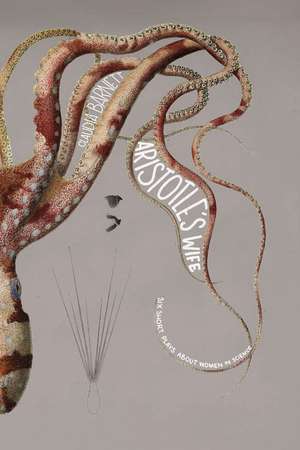Aristotle's Wife: 6 Short Plays About Women in Science: Carnegie Mellon University Press Drama
Autor Claudia Barnetten Limba Engleză Paperback – 21 mar 2025
Each play in this collection explores an imagined moment in the life of a little-known scientist sidelined by gender. Six brilliant women—Pythias of Assos, Susanna Lister, Cecilia Payne-Gaposchkin, Lise Meitner, Esther Lederberg, and Barbara McClintock—vibrantly inhabit these pages (and stages) at points where their personal and professional selves intersect. These plays can be performed together as an evening of theater for smart audiences.
Preț: 122.39 lei
Nou
Puncte Express: 184
Preț estimativ în valută:
23.42€ • 24.45$ • 19.38£
23.42€ • 24.45$ • 19.38£
Carte nepublicată încă
Doresc să fiu notificat când acest titlu va fi disponibil:
Se trimite...
Preluare comenzi: 021 569.72.76
Specificații
ISBN-13: 9780887487125
ISBN-10: 0887487122
Pagini: 80
Dimensiuni: 152 x 229 x 10 mm
Greutate: 0.11 kg
Editura: Carnegie-Mellon University Press
Colecția Carnegie-Mellon University Press
Seria Carnegie Mellon University Press Drama
ISBN-10: 0887487122
Pagini: 80
Dimensiuni: 152 x 229 x 10 mm
Greutate: 0.11 kg
Editura: Carnegie-Mellon University Press
Colecția Carnegie-Mellon University Press
Seria Carnegie Mellon University Press Drama
Notă biografică
Claudia Barnett writes plays about women, history, and science. Her recent projects include Theodosia Redux and her collaboration with Pipeline-Collective, Outside of Here, a twelve-hour play that premiered as a live broadcast event featuring three dozen performers. She is professor of English at Middle Tennessee State University. Her previous books include I Love You Terribly: Six Plays; No. 731 Degraw-street, Brooklyn, or Emily Dickinson’s Sister: A Play in Two Acts; and Witches Vanish.
Recenzii
"A fascinating collection of plays centering and exploring real women in the history of science through a fictional flair of theatre."
"Claudia Barnett’s writing for the stage is always kind of a sly treat. As a playwright, she manages to transport us into the world of her plays without us realizing how we got there. And then we don’t want to leave. Within her smart, smart collection of short plays, Aristotle’s Wife, we are guided into six delightfully different times and places, provided with an arresting new perspective of women and science.
Claudia has an extraordinary gift for spare revelation, and within moments of meeting these women—with (or through) their partners, families, friends, colleagues—we know that they are real women, not placeholders or representations. The characters are at once familiar and fresh. We may not recognize their names, but we most certainly recognize ourselves in them.
In Aristotle’s Wife, the female scientists often claim their space quietly, having followed the paths created by women before them. Sometimes they manage to speak out in a field where a man’s word is law. Other times they remain silent, wondering if they’re fated to forever live 'a minor life.' But the truth is that these women have long been present in all of our lives through their unsung accomplishments.
Recognition and who gets the credit for hard-earned discoveries and contributions is a thread that runs through this collection. (Uh huh, it’s usually someone with a Y chromosome.) But each play has its own distinctive energy and impact.
The plays are often love stories . . . between women and their transformative work. They dig into gender expectations and unearth fascinating fragments of history. They are meditations on how we see the world and our place in it—'I’m an artist.' 'You’re a scientist.' 'Same thing.' And they are always full of genuine humor; beautiful and satisfying in a way that catches us off guard. Which is just as it should be.
Because at the heart of each play is an unexpected window into what it means to be a woman… in science and in life."
Claudia has an extraordinary gift for spare revelation, and within moments of meeting these women—with (or through) their partners, families, friends, colleagues—we know that they are real women, not placeholders or representations. The characters are at once familiar and fresh. We may not recognize their names, but we most certainly recognize ourselves in them.
In Aristotle’s Wife, the female scientists often claim their space quietly, having followed the paths created by women before them. Sometimes they manage to speak out in a field where a man’s word is law. Other times they remain silent, wondering if they’re fated to forever live 'a minor life.' But the truth is that these women have long been present in all of our lives through their unsung accomplishments.
Recognition and who gets the credit for hard-earned discoveries and contributions is a thread that runs through this collection. (Uh huh, it’s usually someone with a Y chromosome.) But each play has its own distinctive energy and impact.
The plays are often love stories . . . between women and their transformative work. They dig into gender expectations and unearth fascinating fragments of history. They are meditations on how we see the world and our place in it—'I’m an artist.' 'You’re a scientist.' 'Same thing.' And they are always full of genuine humor; beautiful and satisfying in a way that catches us off guard. Which is just as it should be.
Because at the heart of each play is an unexpected window into what it means to be a woman… in science and in life."

